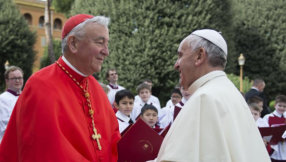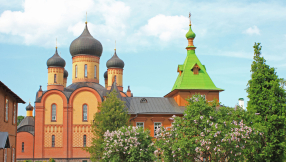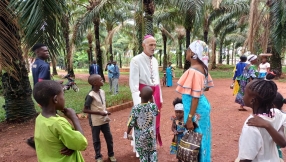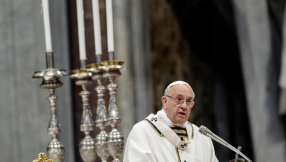Burma's Christians in peace talks with government
Burma has faced decades of oppressive rule by the country’s totalitarian military junta. However, a small glimmer of hope opened up in the South Asian nation last March when the country held its first elections in 20 years.
Although the elections in Burma resulted in many former junta members trading their military uniforms for new political titles, some reforms carried out over the past several months by the new civilian government have pointed to a potential of increased freedoms in the oppressive state.
The rare opportunity for change has resulted in a group of Karen National Union leaders establishing a peace committee in hopes of capitalising on the transformations occurring in their fractured country.
The Karen are a predominantly Christian minority group located in eastern and southern regions of the country that have been at war with the government since shortly after Burma gained independence from the UK in 1948.
The peace committee, established in November, is composed of Karen leaders and an umbrella group of other ethnic minorities all vying for freedoms and autonomy in the tyrannical state.
Members of the KNU and peace committee are hoping that this week’s historic meetings will lay the foundation for a ceasefire that could eventually lead to the political changes - consisting partially of autonomy for Burma's ethnic states - that the Karen and other minority groups have been fighting over for decades.
Due to the protracted conflict, many in the country live in tumultuous human rights conditions with United Nations Refugee Agency estimating that Burma is home to at least 451,000 internally displaced persons.
The violence has left the Karen minority with little social, economic, and cultural development to speak of, and KNU members hope that the talks can lead to a breakdown in violence that will allow Karen children to have access to education and other rights.
"The talks are the very first step in negotiations for a ceasefire," KNU Vice President Saw David Thakabaw told IRIN news.
Hopes for reconciliation and peace were sparked in 2004 when a verbal ceasefire agreement was reached between the KNU and the government. The ceasefire agreement quickly deteriorated, as did much hope for peace and reconciliation in the country.
Today, Burma continues to face critical challenges with regards to its human and minority rights record, leaving Karen leaders and Christian organisations equally hopeful and cautious over what the new attempt at peace talks may deliver.
Ryan Morgan, an advocacy officer at International Christian Concern, “is hoping these talks are going to produce lasting results.”
He also expressed his concern that the international community might be too quick to embrace an uncertain peace in Burma and reinstate diplomatic relations, as well as lift ongoing sanctions on the country.
“We want the West and the United States to be cautious,” Morgan said. “The fact is there is still a considerable amount of fighting going on in Kachin state right now and we’re not even certain that the government has control of the military in some areas.”
According to the ICC, Christians in the country have faced state-sponsored rape, raids, pillaging and other grave human rights violations in the government’s fight to maintain its reign on power.
Indeed, the Karen are concerned that the talks, taking place in the capital of the Karen state Pa-an, could lead to a breakout of violence against their community.
“Despite the talks, the Burmese are still sending supplies and troops into the area and we are afraid that they will use their military power against us again,” KNU general-secretary Zipporah Sein told IRIN news.
The KNU have ordered their forces not to open fire on government troops during the talks.
The new peace talks come just months after the Obama Administration sent Secretary of State Hillary Clinton on a landmark diplomatic visit to the country to gauge the government’s commitment to reform.
Burma’s famous democratic opposition leader Aung San Suu Kyi praised the Obama Administration’s “careful and calibrated" engagement with her native country and expressed that she “deeply believed" that the president of Burma also wants change.
Nevertheless, experts remain cautious and believe that reforms have yet to materialise into transformations for the country's religious and ethnic minorities.
Elaine Pearson of Human Rights Watch argued that human rights abuses - including torture of political prisoners, repression, and atrocities against civilians in conflict zones- have been as much characteristics of Burma's new civilian rule as have the policy reforms that the international community has jubilantly embraced.
“People say that there is change in Burma, but inside the Karen State, there is no change. There are still human rights abuses, fighting, and forced labour,” Zipporah Sein said of the current situation in the predominately Christian Karen state.
With decades of bad news emanating out of the explosive country, the international community has embraced the hope for change in Burma because the reforms are positive developments emerging from an environment of protracted tragedy, according to Morgan.
“The conflict, the warfare, the death of civilians, and attacks specifically targeting Christians are long running issues,” Morgan said.
“ICC is excited about the possibility of changes and we are watching them closely. I think it’s important, though, that the international community and other organisations stay aware of the plight of Christians living in Burma and the persecution that they face,” he added.
The people of the Karen community have echoed similar sentiments with regards to maintaining a cautious optimism over the peace talks.
“There were peace talks before, but it didn’t turn out well. This time, we don’t know what will happen, but there is an opportunity, we have to take it,” Saw Wah Htee, a Karen camp leader told KarenNews.org.













